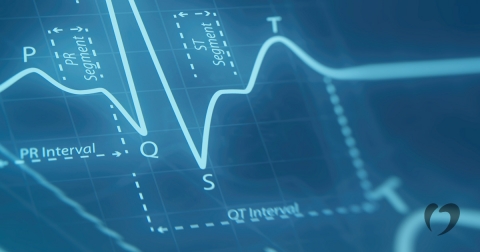Long QT Syndrome: Symptoms, Diagnosis, and Treatment

Long QT syndrome (LQTS) is a disorder of the heart’s electrical system. Every heartbeat is caused by an electrical impulse and is followed by a brief recharging period. The QT interval represents this recharging time and is controlled by ion channels, including potassium, sodium, calcium, and chloride. When there is a defect in one of these channels, the electrical system does not recharge properly and results in a long QT interval.
Symptoms
A long QT interval creates opportunity for an extra beat and can trigger a life-threatening irregular heartbeat. Left untreated, this arrhythmia can result in sudden death even if there have been no previous symptoms. LQTS can occur without symptoms, but those who do have symptoms may notice palpitations and syncope (fainting). LQTS also can cause seizures.
Diagnosis
Long QT Syndrome can be diagnosed from an electrocardiogram (ECG), stress test, or use of a Holter monitor to record heart rhythm activity for a longer period. Because Long QT Syndrome is a genetic disorder that often does not show symptoms, family members of those who have LQTS should talk with their doctor about recommended tests to check for the disorder.
Many patients with LQTS are diagnosed with the condition after having an ECG for other reasons. Exercise, medication, or other conditions can sometimes make LQTS difficult to detect on an ECG, which is why a stress test or Holter monitor may also be used.
Treatment
Treatment for LQTS is aimed at reducing symptoms and preventing the irregular heartbeat that can cause death. Most often, this is done with beta blocker medications. Those whose condition cannot be controlled with medication may receive an implantable cardiac defibrillator, or ICD. This device shocks the heart back into a normal rhythm when necessary to prevent sudden death. Sometimes, a procedure will be used to block the nerves that create the irregular heartbeat.
Additionally, doctors may recommend lifestyle changes for LQTS patients. Intense exercise can trigger an episode of irregular heartbeat in those with LQTS. Your doctor will advise you if physical activity should be limited.
Some medications can affect patients with LQTS. These include a wide range of medicine types, such as antihistamines, antibiotics, antifungals, diuretics, migraine medicines, antidepressants, and heart medication. It is important that all doctors prescribing medicine for LQTS patients be aware of their condition and all medications should be discussed with a cardiologist to ensure they are safe for the patient to take.
If you are at increased risk for LQTS due to a family member’s diagnosis, schedule an appointment with a specialist at the Heart Rhythm Institute at Oklahoma Heart Hospital today.
